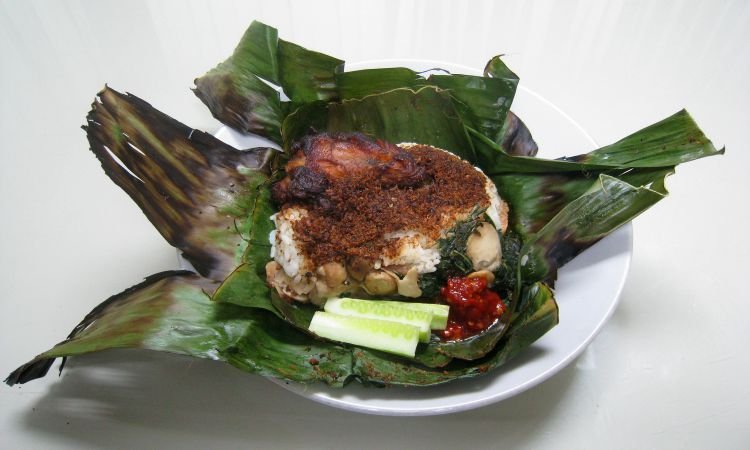 When looking for recipes with rice, we normally think of dishes from Italy, Spain, or Japan. But we must not forget that Indonesia is the 4th country in the world to consume the biggest amount of rice and, because of that, there are various recipes that we can learn from the Indonesian culture to expand our array of favors.
When looking for recipes with rice, we normally think of dishes from Italy, Spain, or Japan. But we must not forget that Indonesia is the 4th country in the world to consume the biggest amount of rice and, because of that, there are various recipes that we can learn from the Indonesian culture to expand our array of favors.
The name nasi bakar means “grilled rice” in the Indonesian language. It’s likely that you have never heard of this before because nasi bakar is not the most international dish from Southeast Asia. Apparently, we can trace its origins back to West Java, and it is certainly popular among Indonesians.
A delightful surprise
Its presentation is what makes it interesting to the eye: each rice portion is wrapped in banana leaves before taking it to the grill. The result is pure magic to your buds, with a slightly sweet aroma and a smoky flavor. And in addition to that, there is the invitation to discover what the filling is each time. Is there something more exciting than opening a packet? Whether it is shredded meat, grilled vegetables, salted fish, or mushrooms, everything goes perfect with rice and it’s always nice to experience this fun little surprise.
It’s all in the aromas
This dish is not only about looks. Of course, the banana leaves add a lot to it but don’t forget that this dish is unique thanks to the peculiar mix of flavors and aromas it has. Some people like it with coconut milk, dried anchovies are always a go-to, and a combination of fresh and aromatic herbs like Indonesian basil, scallion, lemongrass, and kaffir lime leaves are a must to make a perfect nasi bakar.
Finally, to enhance aromas, even more, we recommend you use https://mahatmarice.com/products/jasmine-white-rice/. Many people like to add some turmeric, too, to get vivid yellow-colored rice.
Dive into South Asian culture with this “grilled rice” recipe and enjoy the most amazing flavors from Indonesia!
Ingredients:
- 2 cups of white rice.
- ¼ cup of coconut milk.
- 1 tbsp. of dried anchovies.
- 1 lemongrass stick.
- Some kaffir lime leaves.
- 1 to 2 salam leaves.
- 11 oz (300 g) of chicken breasts.
- 3 red chilies.
- 3 big onions.
- 3 garlic cloves.
- 2 tbsp. of turmeric.
- Ginger to taste.
- Some chopped scallions.
- 1 handful of Indonesian basil.
- Banana leaves and toothpicks.
Preparation:
- Chop your chilies and your onions. In a pot, add some cooking oil, your chopped garlic, your scallions, and your veggies. Stir fry for a few minutes.
- Add your chicken. Cook until done, remove, and set aside. You can shred your chicken when it’s cool.
- Using the same pot to take advantage of the previous flavors, add your aromatic herbs (lemongrass, kaffir lime leaves, salam leaves) and your dried anchovies, and stir fry these for a minute.
- Add your rice with some water and coconut milk, stirring occasionally. Add the turmeric and the ginger, and let it cook for 20 minutes or until the rice is done and there’s no liquid left.
- For the wrapping, place a sheet of banana leaves and scoop a layer of rice in the middle. Add some shredded chicken on top and finish with some Indonesian basil leaves. Fold the flaps to create a little packet and use one or two toothpicks to secure it. Make sure the filling is well contained and that it won’t come out.
- Prepare your charcoal fire at the grill, or turn the heat for your grill pan, and place the packets. Let them sit there until the banana leaves have marks on them and you can smell the sweet and smoky aroma. Your nasi bakar is ready to enjoy!
Helpful tips
You can store the rice and the chicken preparations in the fridge for a few days, and then warm them up, assemble the packets and grill them before serving. We recommend you only grill the packets the moment you know you’re going to have them so as not to lose freshness.
Banana leaves are usually sold in Asian grocery stores. You’ll need to clean them thoroughly before using them, something you can do the day before.
In case you prefer using dried herbs or you don’t have fresh herbs at hand, you should double the quantity to achieve the same effect since dried herbs are less aromatic.




